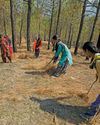
INDIA IS on the verge of creating a carbon market. The move will set emissions targets for emitters and allow overachievers to sell their excess emission cuts, while underachievers will have to purchase them to meet their goals. The market will be created once the Carbon Credit Trading Scheme (CCTs), notified in June 2023, comes in force.
In August 2024, the Bureau of Energy Efficiency (BEE), which will implement CCTS, released the scheme's compliance procedure (see 'Evolution of...'). But emission targets, which will determine CCTS' effectiveness, are yet to be announced. BEE officials say CCTS will likely take effect by 2026.
Simply put, CCTS is a market-based mechanism to reduce or limit emissions. Its genesis lies in India's commitment to meet its Nationally Determined Contributions emissions reduction target for 2030 committed under the Paris Agreement of 2016. One of India's targets is to reduce the "emissions intensity of its GDP by 45 per cent from 2005 levels by 2030". In 2021, India also declared the target of becoming a net-zero emitter by 2070. These global commitments and the increasing impacts of climate change on India generated a need to limit emissions, leading to the government to launch new policies and instruments. CCTS is one such instrument.
The Carbon Border Adjustment Mechanism (CBAM), a tariff to be imposed by the European Union from 2026 (under which the bloc will put an additional price on imported products on the basis of greenhouse gases emitted in manufacturing them) and the development of carbon markets by developing countries like China and Indonesia, have also likely driven India towards CCTS. The challenge, however, is to ensure that the scheme fulfils its purpose of reducing emissions. Here's how the CCTS will work.
INDIAN CARBON MARKET
Denne historien er fra September 16, 2024-utgaven av Down To Earth.
Start din 7-dagers gratis prøveperiode på Magzter GOLD for å få tilgang til tusenvis av utvalgte premiumhistorier og 9000+ magasiner og aviser.
Allerede abonnent ? Logg på
Denne historien er fra September 16, 2024-utgaven av Down To Earth.
Start din 7-dagers gratis prøveperiode på Magzter GOLD for å få tilgang til tusenvis av utvalgte premiumhistorier og 9000+ magasiner og aviser.
Allerede abonnent? Logg på

THE CIRCULARITY ARGUMENT
A circular economy can help India achieve its developmental aspirations while following the low-carbon pathway. It will also help address the challenges of waste management, pollution and overexploitation of natural resources. Industries are already innovating to reuse high-volume wastes and have shown that the transition can usher in both environmental and financial windfalls

Banking on flawed drug voluntary licences
The Medicines Patent Pool is pushing for more VLs, but its bad deal with Novartis on a cancer drug shows the pitfalls

Lasting solutions
For the first time, the UN has recognised the role of indigenous communities in tackling aridity. A repository of traditional knowledge India has the wherewithal to lead the way

IMD at 150
India's journey into modern weather forecasting took a decisive turn 150 years ago with the establishment of India Meteorological Department during the British rule. The agency has come a long way since then, shaping the way the country predicts and responds to its diverse climate challenges

Every drop counts
In drought-prone Marathwada region, 14 villages have managed to counter water shortage by budgeting the resource

Threat to survival
Hollongapar Gibbon Sanctuary in Assam faces ecological challenges as railway electrification and hydrocarbon exploration endanger its fragile biodiversity

'Migration is going to be a battlefield'
AMITAV GHOSH is one of the foremost chroniclers of our times. His literary sojourn includes writings on topics that range from languages to climate change to human lives. His latest book, Wild Fictions, brings some of his works on these issues under one title. In a conversation with RAJAT GHAI, Ghosh shares his views on the future of human movement. Excerpts:

Face of future
California wildfires confirm forest fires are intensifying in a hotter world, emitting substantial amounts of greenhouse gases and reinforcing global warming

Friends of the forest
Residents of 30 villages in Uttarakhand establish a model for public participation in saving forests from wildfires

Climate-crazy playbook
Just hours after his second (and final) term began on January 20, US President Donald Trump unleashed 46 presidential actions. Several of these are centred on the US' climate commitments, energy transition, migration and trade policies, and are likely to have negative global implications